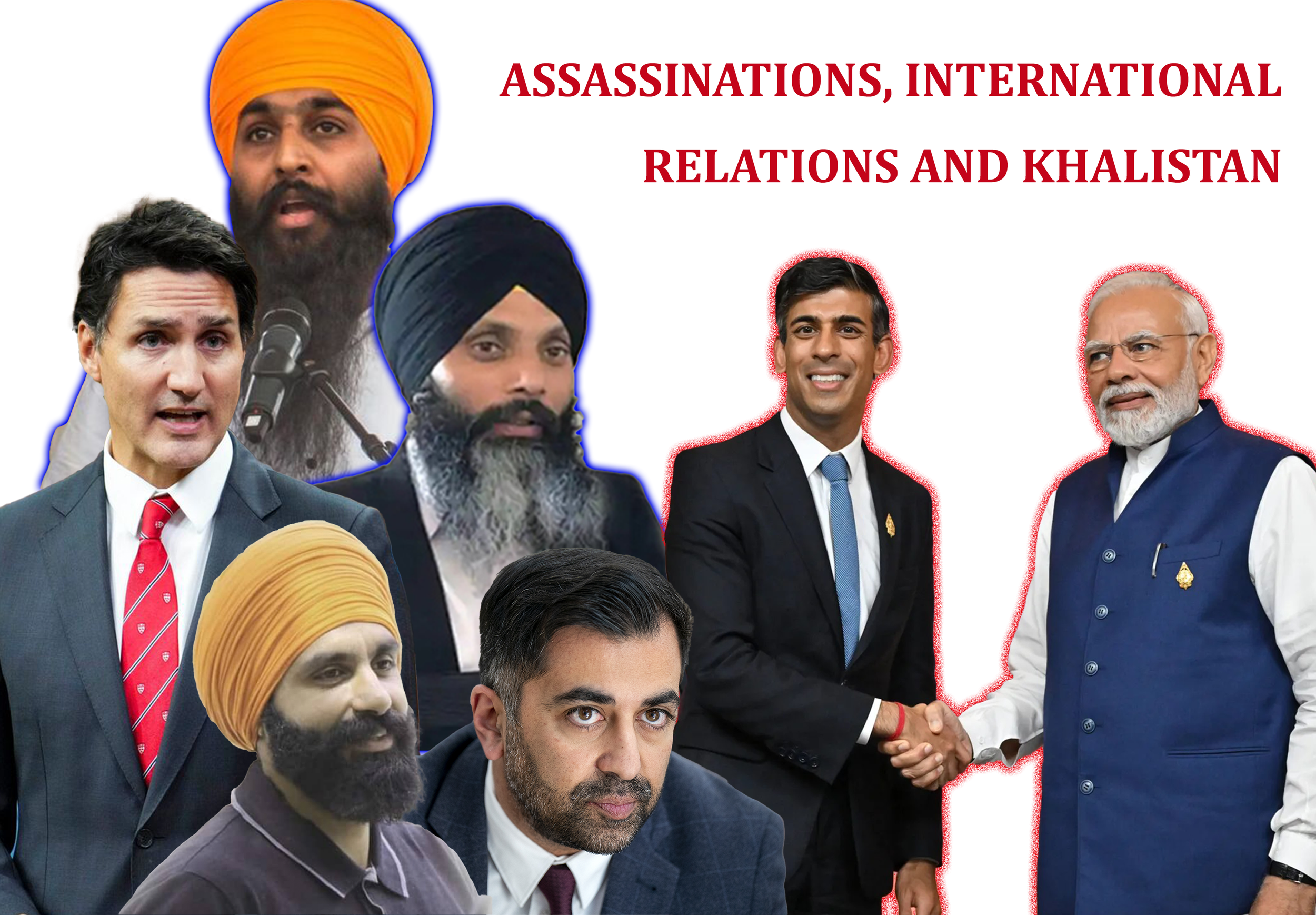Assassinations, International Relations and Khalistan
/Several recent incidents have raised the global profile of the Sikh struggle for sovereignty that has been waging on various fronts under the banner of Khalistan since the Indian government declared war on the Sikh Nation by launching a full-scale military attack on the Akal Takht and Sri Darbar Sahib in Amritsar in 1984.
In June 2023, UK-based prominent Khalistan activist, Avtar Singh Khanda passed away in mysterious circumstances. The events surrounding his death were very suspicious, and despite Sikhs raising the issue of foreign interference, the UK authorities did little to investigate the calls that India had a hand in his death.
In the same month another prominent Sikh activist and leader, Hardeep Singh Nijjar, based in Canada, was shot and killed on the grounds of Guru Nanak Sikh Gurdwara in Surrey. Elsewhere, in Pakistan, a month earlier respected Khalistani leader Paramjit Singh Panjwar, was also assassinated in Lahore. In addition to these killings there have been attacks on other fronts too. Just a few days ago, in Brisbane, Australian police officials said they suspected Hindus had desecrated their own temple to vilify and malign the ongoing referendum for Khalistan.
There is also the ongoing issue of a Scottish national, Jagtar Singh Johal, who has also been arbitrarily held and tortured in India for six years, despite the campaigning of his family and MP, Martin Docherty-Hughes, that calls for UK intervention and his immediate release. In May 2022, the United Nations Working Group on Arbitrary Detention declared his detention arbitrary and unlawful under international law. A few months later independent investigators at Reprieve uncovered that a UK Minister may have authorised British intelligence agencies, MI5 and MI6, to share information with Indian authorities that led to Jagtar’s arrest, detention and torture.
Despite Scottish First Minister, Humza Yousaf’s calls for Jagtar Singh’s immediate release, there has been little to no substantial effort from Westminster to act in accordance with its own duty to protect UK citizens. Notwithstanding the campaigns from Sikhs, independent human rights groups and individual MPs, UK Prime Minister Rishi Sunak has avoided questions in the House of Commons and consistently distanced himself from criticising UK allies in New Delhi.
This week, in a seemingly unprecedented move, the Canadian Prime Minister, Justin Trudeau, along with members of the opposition, made a unanimous decision to share that their intelligence operations showed India were responsible for the assassination of Hardeep Singh Nijjar, and they had acted swiftly to expel Indian diplomat, Pavan Kumar Rai.
Spokespersons from both the US and Australia have expressed 'deep concern’ regarding the matter, whilst UK Foreign Minister said the UK supported Canada’s investigation. There is a lot to digest here, and I wanted to add some perspective at what may seem like a watershed moment in the long-standing Khalistan movement and international relations.
The importance of remaining steadfast in the pursuit of truth, despite the cowardly action of powers committed to vilify a peoples’ quest for sovereignty and criminalise them for standing up for their rights, cannot be overstated. History is replete with examples of peoples’ liberation movements that have endured similar tactics from regimes that felt threatened by their mobilisation.
One such example is the Algerian National Liberation Front (FLN). The FLN was a nationalist movement that fought for the independence of Algeria from France. The French colonial power used a variety of methods to suppress the FLN, including vilification of its leaders, criminalisation of its supporters, and brutal repression of its protests. However, the FLN remained steadfast in its pursuit of truth and justice, and ultimately achieved its goals with the signing of the Évian Accords in 1962.
Another example is the African National Congress (ANC). The ANC was a political organisation that fought for the rights of black South Africans under apartheid. The apartheid regime used a variety of methods to suppress the ANC, including vilification of its leaders, criminalisation of its supporters, and brutal repression of its protests. However, the ANC remained steadfast in its pursuit of truth and justice, and ultimately achieved its goals with the end of apartheid in 1994.
These are just a couple of examples of peoples’ liberation movements from that endured similar tactics from regimes that felt threatened by their mobilisation. In each case, the people remained steadfast in their cause and ultimately achieved their goals.
In addition to the examples of the FLN and the ANC, there are many other examples of peoples’ liberation movements that have endured similar tactics from regimes that felt threatened by their mobilisation. These include the Palestinian Liberation Organisation (PLO), the Irish Republican Army (IRA), and the Zapatista Army of National Liberation (EZLN). In each case, the people have remained steadfast in their pursuit of truth and justice, despite the cowardly action of powers committed to malign and quash their mobilisation.
The Sikhs too have a long history of struggle and sacrifice. From the time of Guru Nanak Patshah, Sikhs have faced persecution and vilification. However, they have always remained steadfast in their faith and their commitment to the Sikh cause. The collective Sikh psyche of panth dhardhis are cognizant of the historical precedent that propels the commitment to the Khalistan Movement. Despite the movement enduring the repressive policy of consequent Indian governments, the Sikhs continue their fight on all fronts.
Remaining steadfast is something the Sikhs know well. However, at this juncture, it is also important for activists to remain vigilant on the narratives that are shared in mainstream media that may appear to help the Sikh cause by virtue of them raising awareness, but these narratives may serve to undermine them by using erroneous language that adds to the propaganda which vilifies and criminalises Sikh dissent. Narratives that adopt language which the Indian media has propagated for decades need to be challenged. This can be done by speaking out against the use of erroneous language that criminalises Sikh dissent or create parallel narratives that are more accurate and reflective of the Khalistan struggle.
Similarly, especially so in light of the statement made by Justin Trudeau and members of the opposition in Canada, it is important to acknowledge that the ramifications of their actions could be significant, if Trudeau and Canada uphold what they claim the country stands for and remain committed to presenting what Sikhs have said from day one to the world; that India is guilty of murder. The initial response from India has been one of denial, and retaliation in expelling a senior Canadian diplomat. The media in India has gone into a frenzy, social media is replete with Indian nationalists calling for more killings, but the Canadian authorities must remain steadfast and present the fullness of their investigation.
This is where Sikhs, and other activists dedicated to upholding human rights, freedom of speech and self-determination need to hold their elected officials to account. Given the brevity of the situation, with reports that Trudeau has briefed members of the Five Eyes – an intelligence alliance that includes Australia, New Zealand, the US and the UK – activists across the diaspora must demand their representatives take stern action against India which has the potential to send shockwaves around the world.
The move from Canada is the bare minimum that is expected of western liberal governments committed to human rights, democracy, and freedom of speech. A lot has already been shared on news outlets and much more will be discussed, but it is not enough to merely state the matter is “deeply concerning” which is a standard response to maintain political appeasement amongst voters and powerful allies.
Now is the time to keep the momentum going, hold them accountable and stay strong on all fronts. The last point is as important as any other, perhaps even the most important in respect of the Khalistan movement to establish Sikh sovereignty. To illustrate why, I’d like to briefly revisit an episode for Sikh history.
In 1707, Bahadur Shah approached Guru Gobind Singh and asked for military assistance from the Khalsa, in his upcoming battle campaign with his brother for the Mughal throne. The Guru accepted his request but imposed some conditions, namely that once Bahadur Shah was in office, he would hand over the perpetrators responsible for the brutal massacre and killing of Sikhs. Bahadur Shah agreed, the Khalsa were duly dispatched by Guru Gobind Singh who also joined the Battle of Jajau at a pivotal stage, which ensured Bahadur Shah victory. The Guru and the Khalsa delivered on their side of the agreement. However, soon after he took over the Mughal throne, Bahadur Shah reneged on his part of the agreement. The lesson to learn from this ordeal lies in what came next.
The Guru did not plea with Bahadur Shah. He did not send any more envoys or representatives to hold Bahadur Shah accountable. Instead, he bestowed the duty of delivering justice for the Sikhs to Banda Singh Bahadur and the Khalsa who as history holds, delivered on the Guru’s decree within a couple of years and in doing so not only brought the perpetrators to justice but established the first post-Guru period manifestation of Sikh sovereignty – the Khalsa republic (1710-1716).
Whilst the current geopolitical circumstances are such that Sikhs are seeking to hold various democratically elected representatives in their host nations to account for India’s atrocities, the Khalsa remains independent from those worldly dealings, and reserves the Guru-ordained decree to deliver justice on its own terms.




